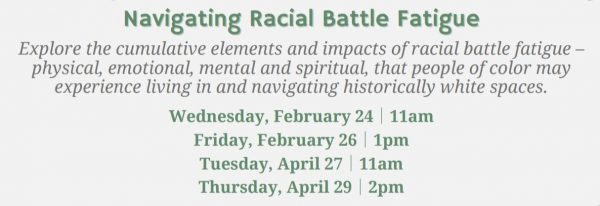CAPS hosts workshop to support students of minority communities
March 4, 2021
The College of Lake County’s chapter of CAPS — Counseling and Psychological Services — acts as a free resource for all students at the college, offering therapy and other supportive services. Psychologists and therapists involved strive towards promoting academic and personal success, empowering mental wellness, and aiding students through whatever struggle they may be facing.
While there can individual, personalized therapy appointments, CAPS also hosts a wide variety of virtual workshops as part of their Spring 2021 mental health series. The workshops are open to the general community, covering topics such as mindfulness, self-compassion, coping with change, and test anxiety.

CAPS workshop flyer
Recently, CAPS presented on learning how to navigate racial battle fatigue, intended to explore the cumulative stressors and setbacks that students of color typically experience.
The event was hosted by Dr. Arellys Aguinaga, the director of CAPS and a licensed clinical psychologist. She was inspired to create this workshop due to the numerous racial injustices present in our society that prompt the term “racial battle fatigue” to be more mainstream.
Aguinaga prepared for this event by doing relevant research on the topic, as she wanted to make sure that her information was accurate, informative, and helpful.
“Not only did we want to increase awareness about this phenomenon, [but] we also wanted to provide concrete coping skills for students to more effectively navigate Racial Battle Fatigue in their day-to-day lives,” Aguinaga said.
The workshop hoped to give students the right language and facts so that larger conversations could become easier. Once students had a concrete understanding, they can begin to evaluate their own life experiences and implement coping strategies.
Aguinaga started by sharing general stressors that college students may experience — emotional distress, academic demands, cultural expectations, etc — as well as specific stressors that students of color face too. These additional stressors include minority stress, imposter syndrome, and microaggressions.
Minority stress refers to the negative experiences that students of color experience, creating layers of discomfort and feelings of being unwelcome. Furthermore, imposter syndrome is a recurring internal feeling of intellectual phoniness, inadequacy, and incompetence, and microaggressions encompass the verbal, behavioral, and environmental offenses that convey animosity toward their target.
Each of these struggles has a cumulative impact, building atop one another until it reaches a place of decreased academic achievement or self-esteem in students of color.
Feeling racial battle fatigue is the typical reaction, a psychological, physiological, and behavioral stress response. Aguinaga tried hard to explain each concept so that the connection was clear.
“We use [these struggles] to set up the context for what Racial Battle Fatigue is, signs to look for, and the impact it has on students of color in particular,” Aguinaga said.
The consistent emotional labor that students of color experience leave them exhausted, and they’re forced to divert their energy away from academic development, leading to disengagement, reduced confidence, and lower persistence levels.
Traditional coping methods like grit, perseverance, and putting in double the effort fall short and fail to recognize the inequalities and injustices waged against people of color. Understanding this, Aguinaga provided alternative coping methods to students.
Strategies to help are very individual, as they rely on experience and situation, but finding a supportive network, engaging in a social network, and performing relaxing activities can bring more aid to students. It is important to maintain one’s mental health and practice mindfulness.

Arellys Aguinaga
“Racial Battle Fatigue does not have to define a student’s experience, and we hope that this workshop helps to increase awareness, nurture resilience, and promote self-advocacy,” Aguinaga said.
Even after employing these strategies and working towards mental wellness, it is still important to acknowledge the effects of racial battle fatigue.
“It is crucial for us to continue engaging these difficult conversations to create lasting societal change, while simultaneously attending to our mental health needs and setting boundaries as needed,” Aguinaga said.
This same workshop will be available to attend in April– the 27th at 11 AM and the 29th at 2 PM. Students and faculty can sign up through the CAPS website.
As a final comment, Aguinaga wishes to remind students, especially those struggling with these feelings, that they are not alone. CAPS provides guidance for all sorts of problems, and no one should hesitate in reaching out if help is needed.






